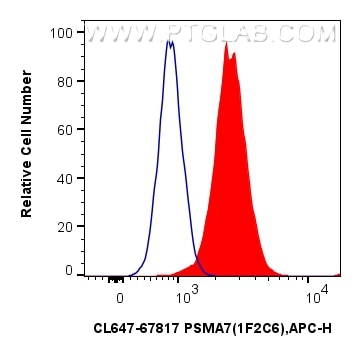Validation Data Gallery
Tested Applications
| Positive FC (Intra) detected in | HeLa cells |
Recommended dilution
| Application | Dilution |
|---|---|
| Flow Cytometry (FC) (INTRA) | FC (INTRA) : 0.40 ug per 10^6 cells in a 100 µl suspension |
| It is recommended that this reagent should be titrated in each testing system to obtain optimal results. | |
| Sample-dependent, Check data in validation data gallery. | |
Product Information
CL647-67817 targets PSMA7 in FC (Intra) applications and shows reactivity with human, mouse, rat samples.
| Tested Reactivity | human, mouse, rat |
| Host / Isotype | Mouse / IgG1 |
| Class | Monoclonal |
| Type | Antibody |
| Immunogen |
CatNo: Ag7821 Product name: Recombinant human PSMA7 protein Source: e coli.-derived, PET28a Tag: 6*His Domain: 1-248 aa of BC004427 Sequence: MSYDRAITVFSPDGHLFQVEYAQEAVKKGSTAVGVRGRDIVVLGVEKKSVAKLQDERTVRKICALDDNVCMAFAGLTADARIVINRARVECQSHRLTVEDPVTVEYITRYIASLKQRYTQSNGRRPFGISALIVGFDFDGTPRLYQTDPSGTYHAWKANAIGRGAKSVREFLEKNYTDEAIETDDLTIKLVIKALLEVVQSGGKNIELAVMRRDQSLKILNPEEIEKYVAEIEKEKEENEKKKQKKAS 相同性解析による交差性が予測される生物種 |
| Full Name | proteasome (prosome, macropain) subunit, alpha type, 7 |
| Calculated molecular weight | 28 kDa |
| Observed molecular weight | 28-30 kDa |
| GenBank accession number | BC004427 |
| Gene Symbol | PSMA7 |
| Gene ID (NCBI) | 5688 |
| RRID | AB_3673646 |
| Conjugate | CoraLite® Plus 647 Fluorescent Dye |
| Excitation/Emission maxima wavelengths | 654 nm / 674 nm |
| Form | |
| Form | Liquid |
| Purification Method | Protein G purification |
| UNIPROT ID | O14818 |
| Storage Buffer | PBS with 50% glycerol, 0.05% Proclin300, 0.5% BSA{{ptg:BufferTemp}}7.3 |
| Storage Conditions | Store at -20°C. Avoid exposure to light. Stable for one year after shipment. Aliquoting is unnecessary for -20oC storage. |
Background Information
PSMA7(Proteasome subunit alpha type-7) is also named as HSPC and belongs to the peptidase T1A family. It is an α-type subunit of the 20S proteasome core complex and participates in degrading proteins through ubiquitin-proteasome pathway (UPP) which plays an important role in the regulation of cell proliferation or cell cycle control, transcriptional regulation, immune and stress response, cell differentiation, and apoptosis.(PMID: 19442227).

